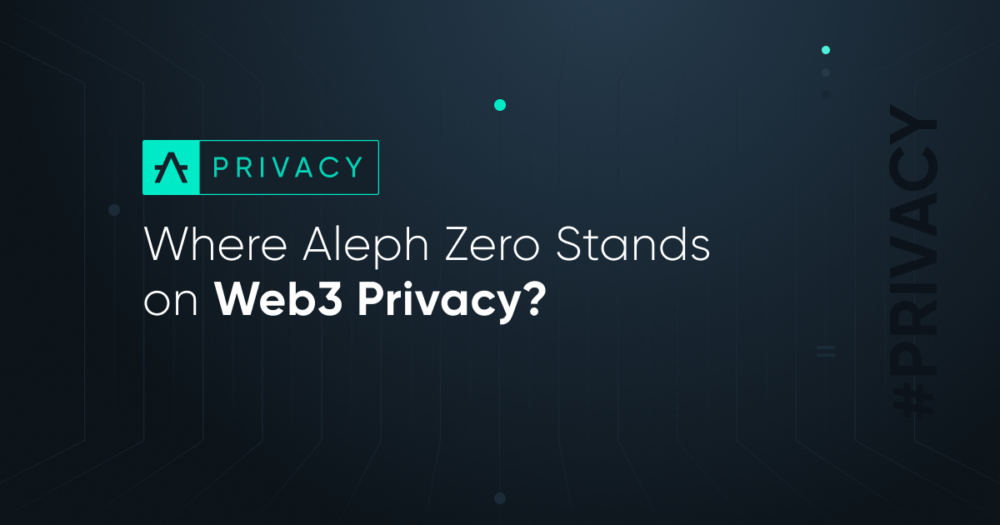Where Aleph Zero Stands on Web3 Privacy
Mar 21, 2024

One of Aleph Zero’s priorities is the protection of sensitive information such as financial data of individuals and companies. We’re working on the development of a data confidentiality layer that will give users the ability to be selective about how they disclose their on-chain information.
Many wonder how this fits into the current state of affairs around privacy in web3. The short answer is that there is a wrong way to go about privacy and there’s a right way to go about privacy. Aleph Zero is focused on developing solutions that allow users to both protect their financial information and stay safe while doing so through AML/CFT compliance.
What the fuss is about
The recently passed MiCA framework even states that:
“The operating rules of the trading platform for crypto-assets shall prevent the admission to trading of crypto-assets that have an inbuilt anonymisation function unless the holders of those crypto-assets and their transaction history can be identified by the crypto-asset service providers operating a trading platform for crypto-assets.”
The rule reflects tightening regulations around crypto service providers as proposed by the FATF guidelines. Under regulations that are informed by these guidelines, exchanges and other service providers can be held accountable for AML violations if they enable this kind of anonymized activity.
As a result, many exchanges have taken a hostile attitude towards a category of cryptocurrencies known as “privacy coins.” Major exchanges such as OKX or Binance and others have delisted assets like Monero and ZCash. There is a distinction, however, to how privacy coins operate and while Monero got permanently delisted from Binance, ZCash has been admitted to stay on the platform due to measures that allow it to be sent publicly.
Privacy itself is not the problem
Web3 builders will be the first to note that not all crypto and web3 technologies fall into the same bucket as privacy coins like ZCash and Monero. There’s a difference between privacy coins and blockchain networks that make use of privacy-enhancing technology.
Privacy coins are a category of cryptocurrencies that prioritize enhanced privacy and anonymity features in their design and functionality. Meanwhile, privacy-preserving blockchains are a subset of the underlying technology behind cryptocurrency that focuses on enhancing the confidentiality of participants’ data and transactions — but while allowing them to be selective about this confidentiality.
In this way, these tools for data confidentiality can provide individuals and organizations with the tools to safeguard their information while still remaining compliant with necessary regulations. This is an approach that has already been accepted by regulating authorities.
The U.S. Department of Treasury stated in its Illicit Finance Risk Assessment of Decentralized Finance that:
“[The] U.S. government supports privacy enhancing technologies that simultaneously allow for or even promote compliance with Anti-Money Laundering and Combating the Financing of Terrorism (CFT) obligations, the use of non-public blockchains by entities that do not comply with AML/CFT obligations or services that may fall outside current regulations will heighten AML/CFT risks.“
Networks that ensure data confidentiality can strike the right balance between protecting user data and cooperating with the government’s role in protecting public safety. They strike the right balance between privacy and transparency.
Data confidentiality for all
This is the kind of work we’re doing. We’re building a network with data confidentiality that is scalable and counts with built-in mechanisms for complying with AML/CFT laws.
Technologies such as Zero Knowledge Proofs (ZKP) and Multi-Party Computation (MPC) have already taken hold of the imagination of Aleph Zero builders. The core team is building Common as a DEX that makes specific use of these technologies to guarantee confidential trades, MEV mitigation, and multi-chain liquidity. Now we’re working on a privacy layer for confidential transactions between users and a ZK-based ID system for fraud prevention that only allows for KYC-ed users to enter, remains auditable at users’ consensus, while the blockchain remains open and transparent for all.
This privacy layer is currently under development. Stay tuned for updates on new capabilities and features as we continue to build the most comprehensive and compliant solution for data confidentiality in web3.
Join the Aleph Zero community, explore the related use cases in our ecosystem, or read more about our commitment to the balance between transparency and compliant data confidentiality in web3.
